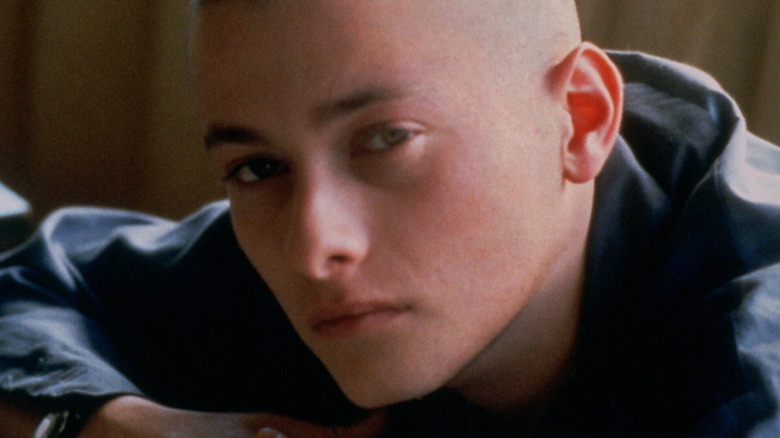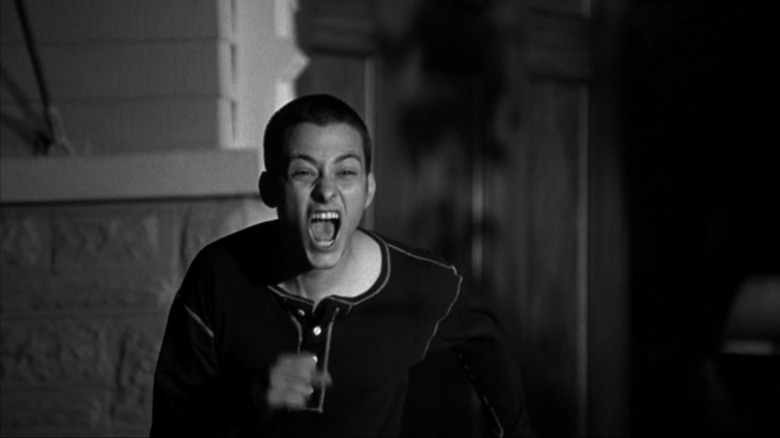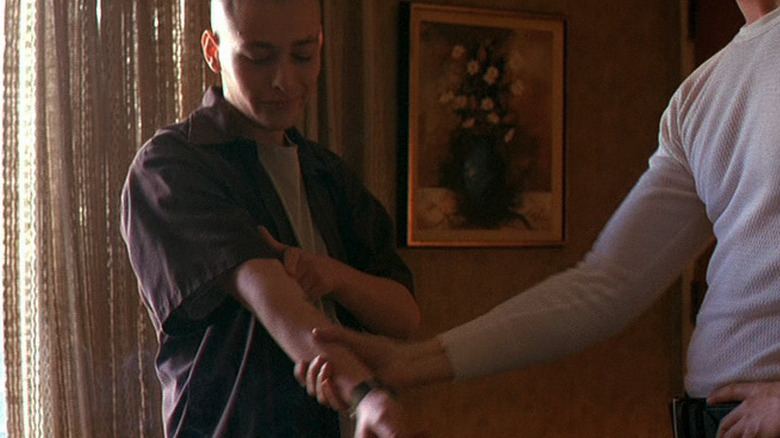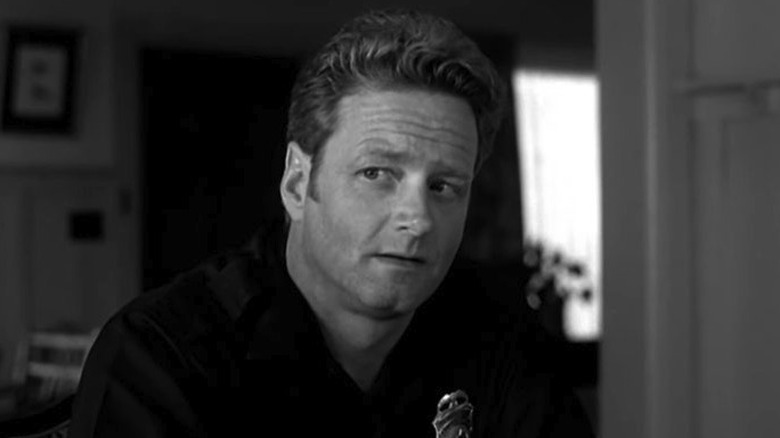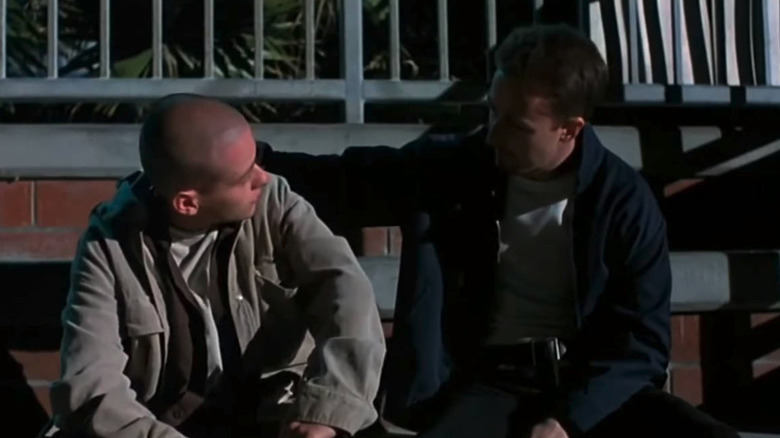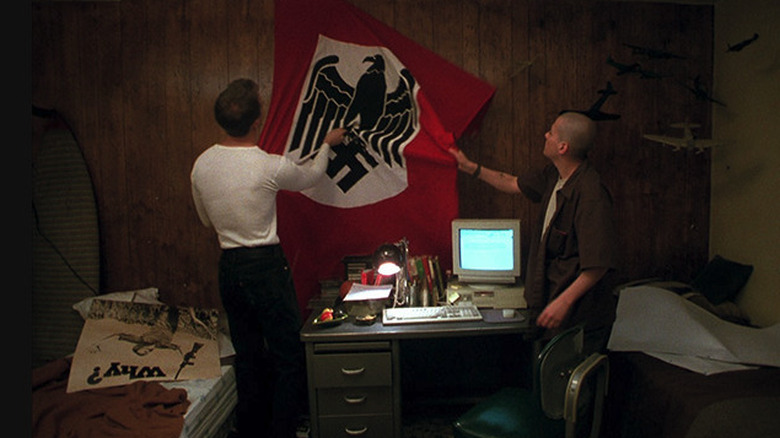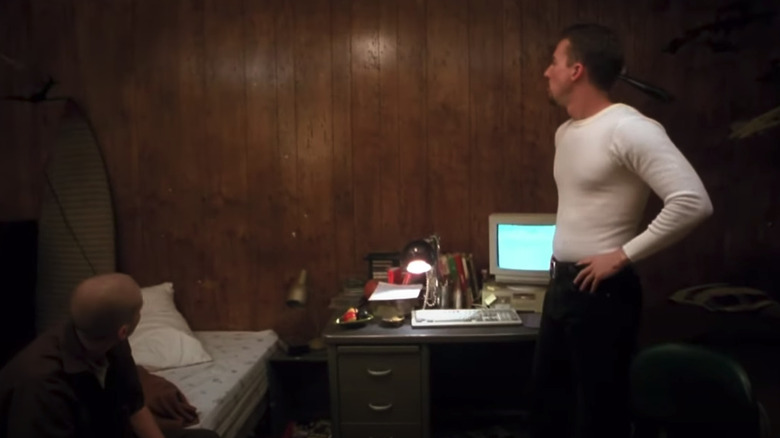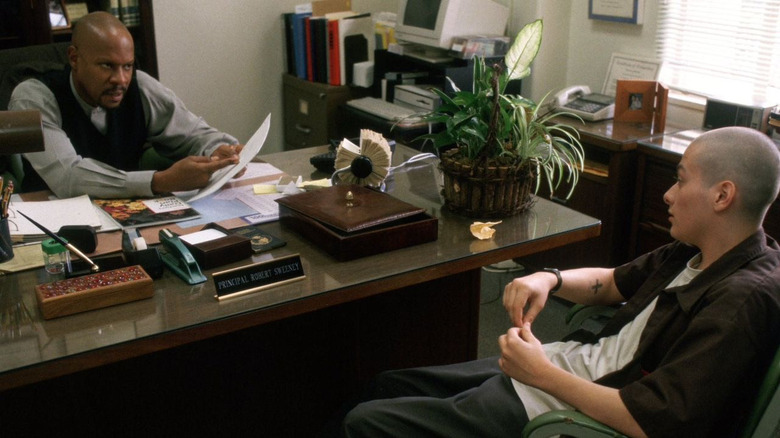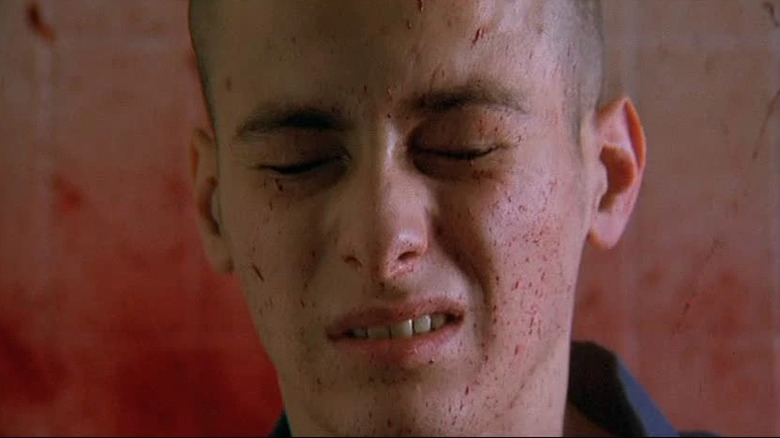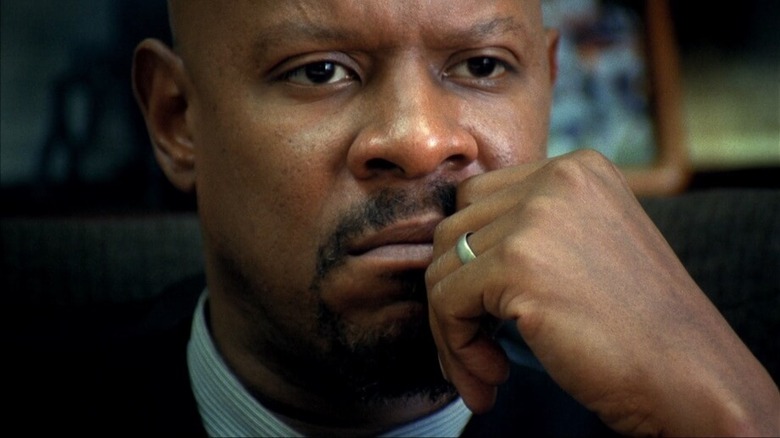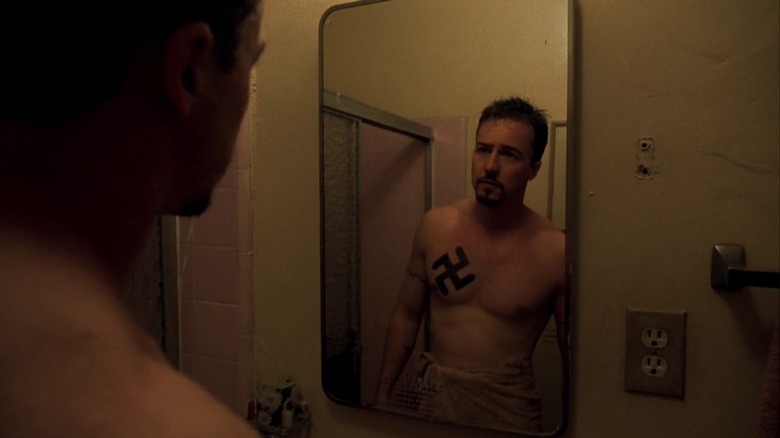The 10 Saddest Things About Danny From American History X
Released in 1998, "American History X" is a bold film that tackles racism in a truly uncomfortable, yet powerful way.
Edward Norton portrays Derek, a young white supremacist who goes to jail for a short stint after violently killing a Black man attempting to break into his truck. During his time in prison, Derek begins to question his belief system, wondering if the propaganda he's been fed has steered him down the wrong road. Once released, he is dismayed to find that his younger brother Danny (Edward Furlong) has joined the same white supremacist gang, called the Disciples of Christ (D.O.C.). As Derek tries to dissuade his brother from the group, Danny's story increasingly looks like one that will have a tragic ending.
In the decades since, the film's stature has only grown. A big part of that is the powerful performances not only from Norton, but Furlong as well. Below are 10 of the saddest (and spoiler-heavy) things about Danny from "American History X."
Danny was initially mortified by his brother's actions
"American History X" provides two narratives — one in the present and one in the past. In order to differentiate itself from past and present, scenes taking place in the past are all stylistically shot in black and white. While this makes it clear to the audiences where we are in the timeline, it also provides context for the characters, as Danny's brother Derek sees the world in black-and-white terms. For him, you're either an extremist on one side or the other.
This is apparent in Derek's character. After his father is shot and killed by a Black narcotics dealer he joins the white supremacist gang D.O.C. His time with them sees Derek violently act out against anyone he deems "different." After playing and winning a basketball game against a group of men from the Crips gang, they decide to retaliate by going to his home and attempting to break into his truck. Once Derek realizes what's happening, he shoots the men and brutally stomps one of their heads on a curb.
Danny watches in horror at his brother's capacity for violence — especially when he sees how happy Derek is for his actions, as he shows no remorse. This scene, while already difficult to watch due to the subject matter, is especially upsetting to see from Danny's point of view. Danny has just lost his father and is now watching his older brother slip into darkness. And the worst part is that audiences see how Danny was so distraught by Derek's actions, only for him to follow in his footsteps of hatred a few short years later. Danny went from being mortified by Derek's actions to putting him on a pedestal.
Danny had no one to protect him
Following the murder of their father, "American History X" takes audiences to the past, where the Vinyard family are picking up the pieces of their lives. Doris Vinyard (Beverly D'Angelo) has brought her new boyfriend home for a meal with her children. They are discussing riots and police brutality during the time of the 1992 Rodney King LA riots. Derek takes the perspective that all Black people are criminals, while his mother's boyfriend suggests that circumstances have turned the riots into an expression of rage. In the end, Derek gets verbally abusive toward his family, all except for Danny, who joins in with his brother and laughs with his jokes because he wants his approval. That is, until he starts to violently attack his sister for disagreeing with his opinions.
This scene shows that the racist roots have begun to take hold for both Derek and Danny. For Derek, we see it in his anger. For Danny, we see it in his need to make his brother proud — just as their father was proud of Derek for agreeing with his racist rants at the very same dinner table.
So, once Derek goes to prison for murder, Danny has no one to protect him and becomes an easy target for the D.O.C. gang. Derek's old mentor, Cameron Alexander (Stacy Keach) cuts contact with Derek as he's in prison, and sets his focus on grooming and mentoring Danny to take his place.
Sadly, Danny never stood a chance.
Danny became his father
Danny begins to realize that it wasn't his father's death that sent Derek off to join his neo-Nazi group — it was his father himself. Danny remembers a time when Derek discussed his new history teacher, Dr. Sweeney (Avery Brooks), at the dinner table. Initially, Derek looked up to him, but once their father learned that Dr. Sweeney was a Black man teaching Black literature, things took a turn at the dinner table.
The film shows him urging Derek to question Dr. Sweeney, sharing that these days, people are forced to hire under-qualified employees for a job in order to fit a racial quota. He suggests it's not fair that qualified "hard-working Americans" are now being overlooked for people who don't fit in his version of America. Derek quickly changes his stance to agree with his father, causing his dad to say that he's proud of him. As Danny reflects on the conversation, he begins to cry, realizing the same indoctrination has claimed him. They've both became versions of their dad.
The scene is a powerful moment, showcasing how their father's racism has clouded his judgement. Dr. Sweeney is likely the most qualified person for his job, yet their father insists that under-qualified people are given jobs over qualified ones; according to him, Dr. Sweeney is in the wrong.
Danny just wants Derek's approval
When Derek returns home from his time in prison, he and his brother reunite with such love and excitement. It's a sweet moment that is ruined once Derek takes in the appearance and attitude of his younger brother. Danny proudly shows Derek his D.O.C. tattoo in the hopes of getting his approval. However, much to his dismay, Derek looks at Danny with shame, resulting in Danny saying "I thought you'd be proud of me."
Danny did all of this for his brother, to make his brother proud that he was carrying on the D.O.C. fight in Derek's name while he couldn't. But after his time reflecting in prison, all Derek sees when he looks at Danny is a mirror image of himself from years prior. He sees the rage, he sees the entitlement, and he sees his own mistakes being reflected back at him.
Much to Derek's dismay, Danny has done everything he can to become Derek, while Derek has done everything he could to stop being who he was. It's a heartbreaking moment, as you can see the disappointment in both brothers' eyes, with Derek realizing that he's failed his brother, and subsequently ruined Danny's life.
Danny makes his own choices
When Derek returns home from prison, he spends the majority of his time trying to get Danny away from the D.O.C. gang. Derek attends an event being held by the D.O.C. where he confronts his old mentor and gang leader Cameron Alexander, asking why the gang left him to essentially rot in prison where he was abused. Derek then proceeds to violently attack him and tells the gang to stay away from Danny. The two brothers leave and have a talk where Derek shares with Danny his experience in prison, which included being abused and assaulted by a neo-Nazi gang and saved by a black inmate.
Much of Danny's actions in "American History X" are to make others happy, whether it was his brother or Cameron Alexander. This time, Derek gives Danny the choice, stating that he's not going to tell him what to do. Instead, he's just sharing his opinions with Danny because he loves him and thinks of Danny as his best friend.
From there, Danny makes his own choice to change his life. The brothers go home and share a sweet moment with their family before heading to their bedroom. Danny looks at the racist posters hanging on the wall before silently getting up to remove them. The two take everything down together without saying a word. It's a powerful moment in itself, but it also acts as the first time that Danny truly makes a choice on his own.
Danny stares at a blank wall
Once Danny and Derek have taken down all the racist posters and Nazi imagery in their bedroom, they are left to stare at an empty wall. Derek leaves the room to shower while Danny stays in the bedroom deep in thought about where this leaves him now.
It's a compelling moment, as it showcases that Danny is literally left with a clean slate. Up until now, his entire life has been influenced to think one way. While he still might hold some of the same stances and opinions, he's now made the choice to end the violence that's consumed him, his brother, and his father.
Much like Derek felt deep shame when seeing Danny for the first time as part of the D.O.C. gang, Danny is feeling the weight of his actions as he sits on his bed in an empty room. In this small moment, audiences see a glimmer of positivity, as it looks like Danny might reset his life and enjoy a real childhood. It gives hope that Danny will be able to change things around, especially since he's only shown hatred when being influenced to do so.
Unfortunately, Danny never gets the chance to make things right, and that's what makes this scene so heartbreaking.
Danny's paper had a hint of hope
At the beginning of the film, Dr. Sweeney gives Danny an assignment to write an essay about his brother Derek. He wants Danny to look at how Derek's ideology has affected their family and how Danny views the world. As Danny is working on his paper throughout the film, viewers see him coming to terms with the idea that his life has been impacted by the choices of his brother. He learns that, ultimately, his brother's decisions were affected by his father's own racist beliefs.
His eyes have opened to the complex nature of racism, realizing that it stems from hatred. Danny includes in his paper the idea that at its core, "hate is baggage." While Danny hasn't become a completely different person, his paper hints at a brighter future, that he understands the weight and potential consequences of his choices in life.
Danny chooses to end his paper with a quote from Abraham Lincoln's first inaugural address, insisting that people are not enemies. While "American History X" has a tragic and violent end, Danny's paper gives a glimmer of hope that if someone like Danny and his brother Derek can change, maybe it's not too late for others.
Danny's death
Just as things seem to turn around for Danny, audiences are given a gut-wrenching end for his character. As he's about to hand in his paper to Dr. Sweeney, he is murdered in the school bathroom. Once he looked his murderer in the eye, he didn't even seem confused as to why it was happening.
Earlier in the film, Danny interacts with the same kid at school. He's a young Black teenager Danny meets in the bathroom as he and three friends are beating up another kid. While Danny doesn't say anything, his confidence stops the three teens from continuing their attack. Instead, they claim that they have to get to class. This same kid is the one who later shoots Danny dead in the bathroom — likely as a power play to show strength.
Once Derek arrives on the scene and finds his dead brother in the bathroom he immediately begins to cry as he holds Danny's lifeless body. Instead of reacting with anger, he simply asks "What did I do?", blaming himself for introducing Danny into a violent "us vs them" mentality.
It's a devastating end to a character who showed promise of a brighter future.
Danny's death represents how Dr. Sweeney is fighting a losing battle
"American History X" is a powerful, thought-provoking story that tackles difficult questions about people's relationship with race. While that's an uncomfortable conversation, it's the heart of the film, as both Derek and Danny must learn how their perceptions on race help shape the world.
This is never more prevalent than with Derek. Throughout the film, audiences see that the only characters who ever truly help him on his journey are two Black men — his friend Lamont (Guy Torry) from prison, and his old high school teacher, Dr. Sweeney. It's thanks to Sweeney's guidance that Derek begins to have a change of heart. Similarly, it's Sweeney's private American History X class with Danny that gives the young teen another perspective on race and how his family has influenced him to go down a violent path.
However, Danny's death shows that Dr. Sweeney is fighting a losing battle. He continues to try and help his students, yet the cycle of violence swallows them up whole — on both sides. For a film that attempts to show redemption in its main characters Derek and Danny, the ending is a bleak tale, one that suggests violence would have found them no matter what path they ended up taking.
Danny's legacy
Perhaps the saddest thing about Danny, as it turns out, is that "American History X" fans don't have the full picture on what message his story, life and death were ultimately intended to convey.
"American History X" director Tony Kaye had a legendarily difficult time working on the film, going to war with New Line Cinema over the film's ending and ultimately having parts of the film (including the ending) re-written by Norton himself. Ultimately, Kaye distanced himself from the project, refusing to watch the final cut for years. So, what was Kaye's intended ending? Over on Reddit, theories abound regarding Kaye's vision, which would have reportedly had Derek shaving his head after the death of Danny — implying that the cycle of violence and hate was beginning again.
According to a 2020 ScreenRant article, the ending of the released film conveyed much the same message, even if Kaye took umbrage with it.
"In Norton's version, Derek sees his ideologies bite back in the worst possible way when Danny is gunned down after he emulated his Neo-Nazi ways. As Derek mourns, Danny's voiceover reciting Lincoln's words can be heard," the article reads. "Though still depressing and with the same message about the cycle of violence, this new conclusion wasn't as hopeless as the original. This was one of the many things Kaye took issue with, which led to 'American History X”s controversies that weren't even related to its subject matter."
Either way, there's little doubt that Danny's death haunted his older brother, long after the movie's conclusion.
